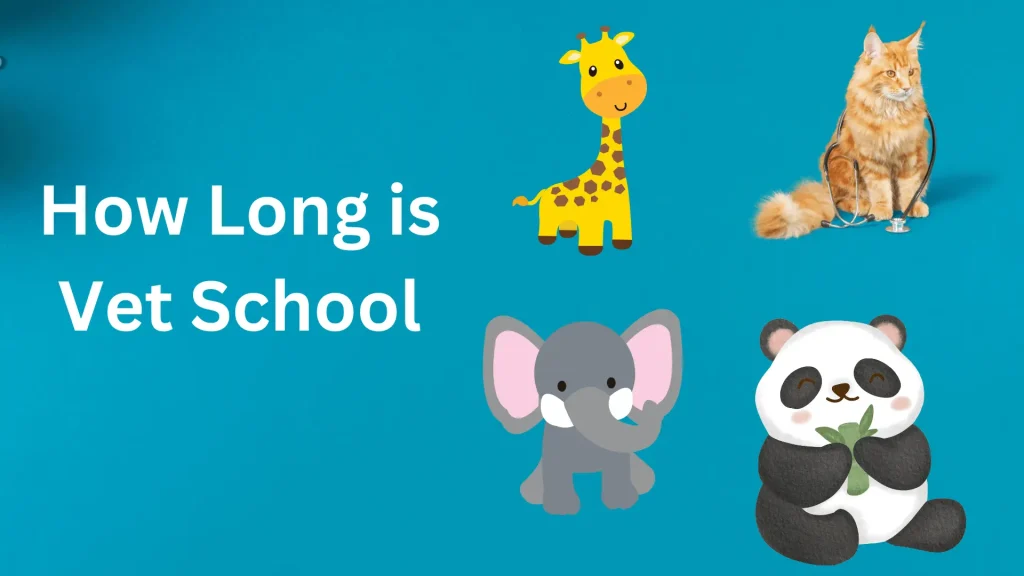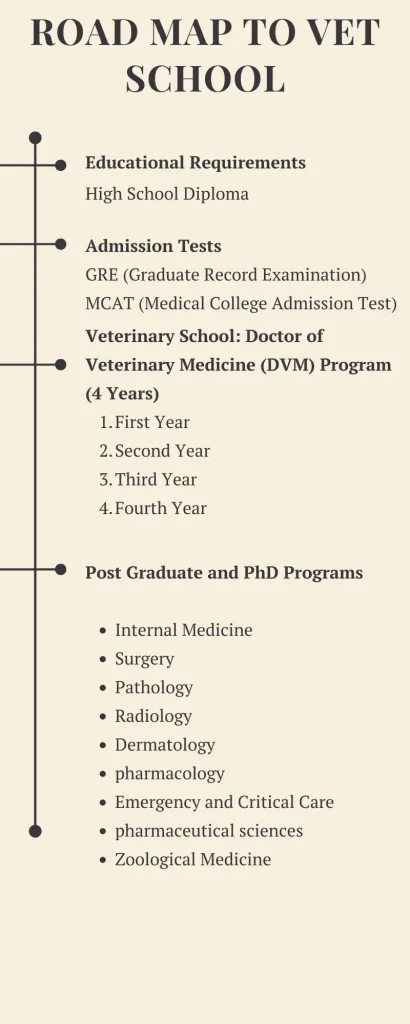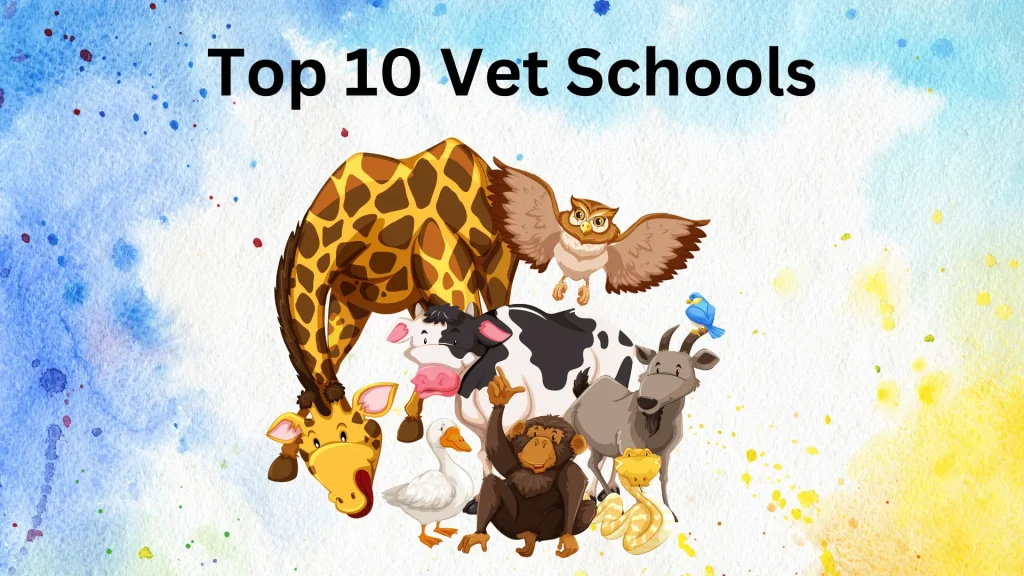How Long is Vet School?
When contemplating a career as a veterinarian, a common question that arises is, “How long is vet school?” This crucial piece of information helps prospective students plan their academic and professional journey. Vet school involves a rigorous and rewarding educational path that prepares students for a diverse and impactful career in animal healthcare.
What is Vet School?
Veterinary school, commonly referred to as vet school, is a specialized educational institution where students undergo rigorous training to become licensed veterinarians. The curriculum is designed to provide both theoretical knowledge and practical skills essential for diagnosing and treating animals.

In vet school, students study a wide range of subjects, including animal anatomy, physiology, pathology, pharmacology, and surgery. The aim is to equip future veterinarians with the expertise to care for animals’ health, prevent diseases, and conduct research that can lead to advancements in animal and human medicine.
How Long is Vet School
Undergraduate Program: Pre-Vet Education (4 Years)
Freshman Year (Year 1)
Courses: General Chemistry, Biology, Mathematics, English Composition.
Focus: Introduction to basic sciences and foundational skills necessary for higher-level courses.
Sophomore Year (Year 2)
Courses: Organic Chemistry, Physics, Advanced Biology, Animal Science.
Focus: Building on scientific knowledge with more specialized courses related to animal science and health.
Junior Year (Year 3)
Courses: Biochemistry, Microbiology, Genetics, Animal Nutrition.
Focus: Delving deeper into biological processes and understanding the nutritional needs of animals.
Senior Year (Year 4)
Courses: Physiology, Anatomy, Zoology, Electives in Animal Behavior or Ecology.
Focus: Advanced study of animal anatomy and physiology, preparing for the veterinary school application process.
Veterinary School: Doctor of Veterinary Medicine (DVM) Program (4 Years)
First Year
Courses: Gross Anatomy, Physiology, Histology, Embryology, Principles of Surgery.
Focus: Fundamental knowledge of animal anatomy and physiology, introduction to surgical principles.
Second Year
Courses: Pharmacology, Pathology, Immunology, Clinical Medicine.
Focus: Study of diseases, medications, and immune responses in animals, with a focus on clinical applications.
Third Year
Courses: Diagnostic Imaging, Small Animal Medicine, Large Animal Medicine, Clinical Pathology.
Focus: Hands-on experience with diagnostic tools and treatment of various animal species.
Fourth Year
Courses: Clinical Rotations, Specialties (Dermatology, Cardiology, Oncology), Surgery.
Focus: Practical experience in a clinical setting, exposure to specialized fields of veterinary medicine.

How to Enter Vet School
Educational Requirements
- High School Diploma: Strong performance in sciences (Biology, Chemistry, Physics).
- Undergraduate Degree: Bachelor’s degree in a related field (Biology, Animal Science, Pre-Vet).
Entrance Exams
- GRE (Graduate Record Examination): Commonly required for vet school applications.
- MCAT (Medical College Admission Test): Some schools may accept MCAT scores instead of GRE.
Additional Requirements
- Work Experience: Veterinary-related experience (internships, volunteer work).
- Letters of Recommendation: Strong endorsements from academic or professional mentors.
- Personal Statement: An essay highlighting motivation, passion, and suitability for a veterinary career.
Application Process
Applying to vet school involves several steps:
- Research Vet Schools: Identify vet schools that align with your career goals and interests.
- Complete Prerequisites: Ensure you meet all educational requirements.
- Take Entrance Exams: Prepare for and take the GRE or MCAT.
- Gain Experience: Accumulate relevant veterinary experience.
- Prepare Application Materials: Gather transcripts, letters of recommendation, and a personal statement.
- Submit Applications: Apply through the Veterinary Medical College Application Service (VMCAS) or directly to vet schools.
Entering vet school requires meticulous preparation, from excelling in relevant coursework to gaining hands-on experience with animals. Prospective students must demonstrate a strong academic record, perform well on standardized tests, and provide compelling evidence of their commitment to the field through personal statements and letters of recommendation.
Post Graduate and PhD Programs
After completing a Doctor of Veterinary Medicine (DVM) degree, veterinarians can pursue postgraduate studies to specialize in specific fields of veterinary medicine. Postgraduate programs typically include residencies and internships that provide advanced training in areas such as:
- Internal Medicine: Focusing on diseases and disorders of internal systems in animals.
- Surgery: Advanced training in surgical procedures for various animal species.
- Pathology: Studying the nature and causes of diseases in animals through laboratory analysis.
- Radiology: Specializing in diagnostic imaging techniques like X-rays, CT scans, and MRIs.
- Dermatology: Dealing with skin conditions and allergies in animals.
- Emergency and Critical Care: Providing specialized care for animals in critical conditions.
- Zoological Medicine: Working with exotic and zoo animals, including wildlife conservation efforts.
Furthermore, veterinarians interested in research and academia can pursue Ph.D. programs in veterinary sciences. A Ph.D. in veterinary sciences involves conducting original research and contributing to advancements in animal health and welfare.
Top 10 Vet Schools
When considering where to pursue veterinary education, the reputation and offerings of the institution play a significant role. Here are ten of the top veterinary schools globally, known for their comprehensive programs and research contributions:

University of California, Davis (UC Davis), School of Veterinary Medicine – Offers diverse specialties including wildlife health, aquatic animal health, and shelter medicine.
Cornell University, College of Veterinary Medicine – Known for its strong emphasis on clinical training and research in areas like infectious diseases and veterinary oncology.
Royal Veterinary College, University of London – Offers a range of programs including animal behavior, veterinary epidemiology, and veterinary public health.
University of Pennsylvania, School of Veterinary Medicine – Noted for its focus on research in areas such as genetics, immunology, and infectious diseases.
University of Guelph, Ontario Veterinary College – Offers programs in food animal medicine, equine medicine, and veterinary pathology.
Colorado State University, College of Veterinary Medicine and Biomedical Sciences – Known for its veterinary teaching hospital and research in biomedical sciences.
University of Sydney, Faculty of Veterinary Science – Offers programs in wildlife health, veterinary conservation biology, and veterinary public health.
Texas A&M University, College of Veterinary Medicine & Biomedical Sciences – Known for its large animal hospital and research in veterinary microbiology and genetics.
Massey University, Institute of Veterinary, Animal and Biomedical Sciences – Offers programs in wildlife health and veterinary epidemiology.
University of Edinburgh, Royal (Dick) School of Veterinary Studies – Known for its veterinary pathology, infectious diseases, and global health programs.
Each of these institutions offers unique strengths and opportunities for aspiring veterinarians to specialize in various fields of veterinary medicine.
Factors Affecting the Length of Vet School
Several factors can influence the duration of veterinary school and the overall experience:
Curriculum Structure: Differences in how vet schools organize their pre-clinical and clinical training phases can affect the length of the program.
Specialization: Pursuing postgraduate studies or specializing in a specific area of veterinary medicine can add additional years to the education timeline.
Research Opportunities: Involvement in research projects or pursuing a Ph.D. can extend the time spent in vet school.
Clinical Rotations: The availability and duration of clinical rotations can vary, impacting the overall length of the program.
Internships and Residencies: Completing internships and residencies for advanced training in specialties can add several years beyond the DVM degree.
Understanding these factors allows students to plan their education path and choose programs that align with their career goals.
Final Verdict
Becoming a veterinarian requires dedication, rigorous academic training, and hands-on experience. The journey through vet school, from undergraduate studies to postgraduate specialization, prepares individuals to excel in animal health care and contribute to veterinary medicine. By choosing reputable institutions, gaining relevant experience, and exploring opportunities for specialization, aspiring veterinarians can embark on a fulfilling career path.
FAQs
How long does it take to become a veterinarian?
It typically takes 8 years after high school: 4 years for undergraduate studies and 4 years in veterinary school.
What are the prerequisites for vet school?
Prerequisites often include coursework in biology, chemistry, physics, and mathematics, along with hands-on experience with animals.
How competitive is admission to vet school?
Admission is highly competitive, with vet schools looking for strong academic records, relevant experience, and competitive entrance exam scores.
Can I specialize as a veterinarian?
Yes, after earning a DVM degree, veterinarians can pursue specialties through postgraduate programs, residencies, and internships.
What are some top veterinary schools globally?
Institutions like UC Davis, Cornell University, and the Royal Veterinary College are renowned for their veterinary programs and research contributions.
